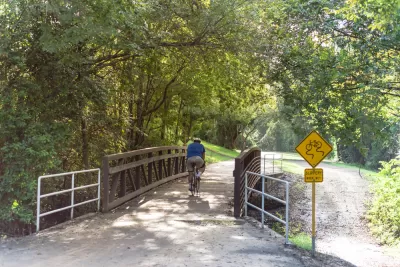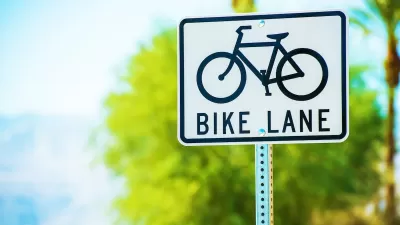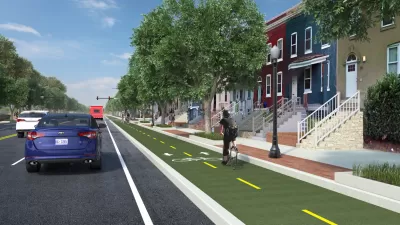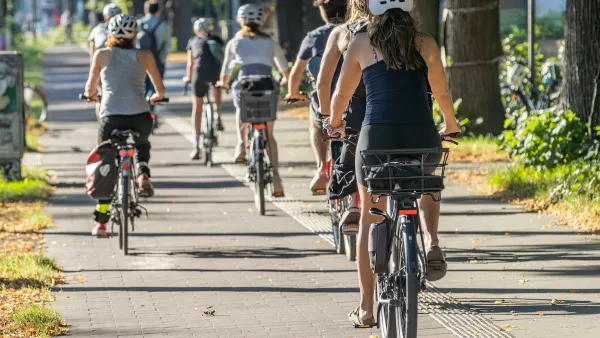The famously car-centric city is investing more than ever in bike infrastructure, with ambitious plans to build 1,800 miles of protected bike lanes and trails.

“Is Houston becoming more bike-friendly?” asks an article by Dug Begley. According to the article, the city has considerably more bike lanes than it did a decade ago. “What exactly has happened, however, is hard to pinpoint, said BikeHouston executive director Joe Cutrufo.”
The city doesn’t exactly have a reputation for bike friendliness. “Many cities, in the past five or six years, outpaced Houston in creating on-street bicycle lanes, often protected by parking on the street or reflective sticks.” In fact, Houston has often found itself at the bottom of “bike friendliness” lists. “What is unclear, for now, is how Houston will rank in the next couple years because of investments by Harris County Precinct One Commissioner Rodney Ellis on local streets, City Hall committing to expanded bike lanes along some routes, and new trails along various bayous developed by the Houston Parks Board and area management districts.”
As the article notes, “Protection, or the sense of protection can be a huge factor in how often and who uses bike lanes. New green lanes along Waugh, Commonwealth, Gray and Austin all feature large concrete curbs that are much harder for cars and trucks to simply leap,” making more people feel safe on Houston streets.
“The city’s bike plan — for 1,800 miles of safe trails and protected lanes — maps out where trails are wanted and where they should be aligned with the recent work.” However, Begley writes, “Of the 1,800 miles planned, less than 400 miles of it is complete. Fewer than 30 miles of protected on-street lanes exist — through that is up from less than 13 miles six years ago, when Houston Mayor Sylvester Turner called for a ‘paradigm shift’ in the city’s transportation system.”
The city’s efforts to improve bike safety are laudable in light of some grim statistics. “The number of pedestrians and cyclists killed annually in Harris County has jumped from 113 in 2015, to 193 last year. The 24 cyclists killed in 2021 were double the total for 2016.”
FULL STORY: Is Houston becoming more bike-friendly? A car-free developer says yes.

Maui's Vacation Rental Debate Turns Ugly
Verbal attacks, misinformation campaigns and fistfights plague a high-stakes debate to convert thousands of vacation rentals into long-term housing.

Planetizen Federal Action Tracker
A weekly monitor of how Trump’s orders and actions are impacting planners and planning in America.

San Francisco Suspends Traffic Calming Amidst Record Deaths
Citing “a challenging fiscal landscape,” the city will cease the program on the heels of 42 traffic deaths, including 24 pedestrians.

Defunct Pittsburgh Power Plant to Become Residential Tower
A decommissioned steam heat plant will be redeveloped into almost 100 affordable housing units.

Trump Prompts Restructuring of Transportation Research Board in “Unprecedented Overreach”
The TRB has eliminated more than half of its committees including those focused on climate, equity, and cities.

Amtrak Rolls Out New Orleans to Alabama “Mardi Gras” Train
The new service will operate morning and evening departures between Mobile and New Orleans.
Urban Design for Planners 1: Software Tools
This six-course series explores essential urban design concepts using open source software and equips planners with the tools they need to participate fully in the urban design process.
Planning for Universal Design
Learn the tools for implementing Universal Design in planning regulations.
Heyer Gruel & Associates PA
JM Goldson LLC
Custer County Colorado
City of Camden Redevelopment Agency
City of Astoria
Transportation Research & Education Center (TREC) at Portland State University
Jefferson Parish Government
Camden Redevelopment Agency
City of Claremont





























